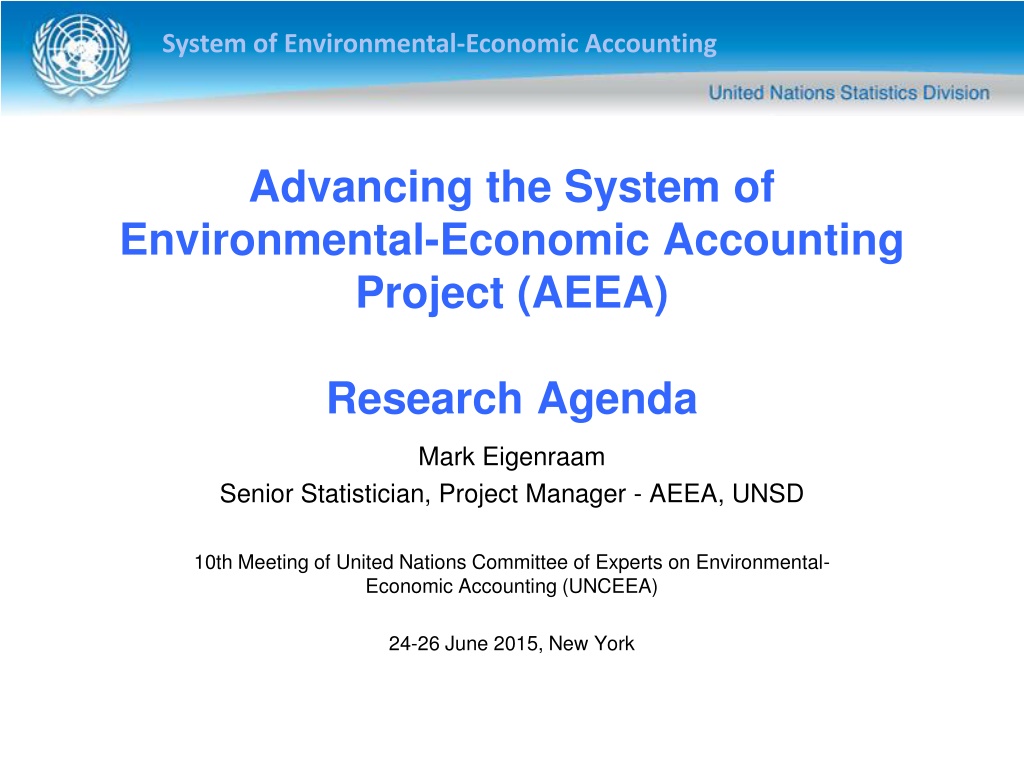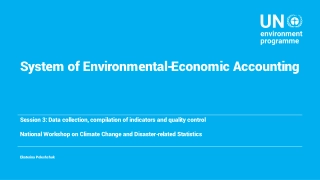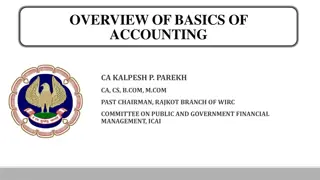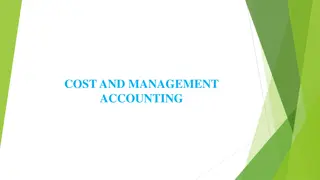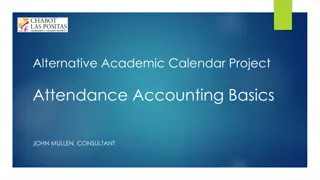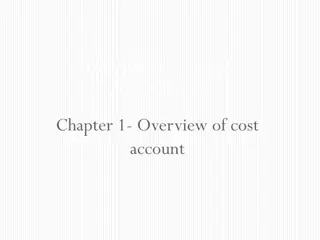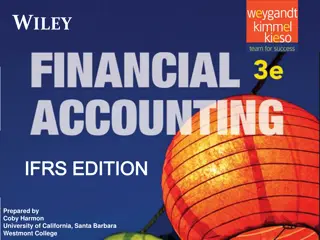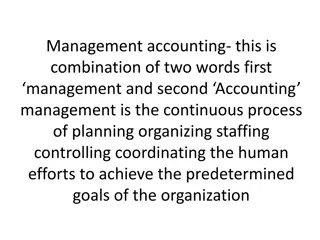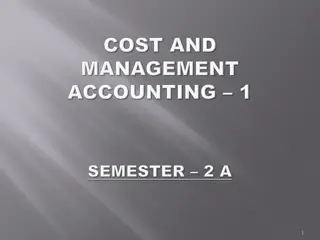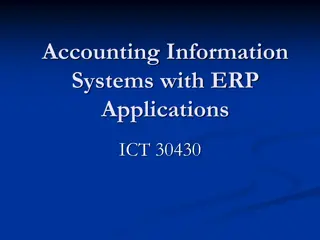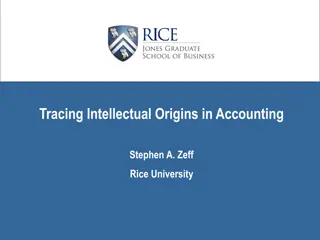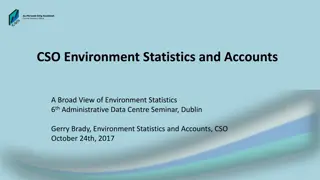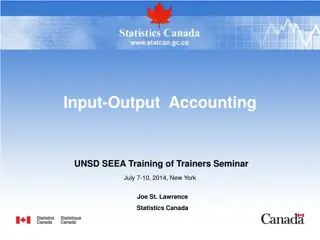System of Environmental-Economic Accounting (AEEA) Project Overview
This project delves into advancing the System of Environmental-Economic Accounting (AEEA) with research agenda focusing on progress, outcomes from expert forums, technical guidance, and national programs across seven countries. It includes training materials at different levels covering concepts, data compilation, and working with country examples. The modules introduce classifications, spatial units, ecosystem accounting, biodiversity, carbon and water accounts, ecosystem services, and more.
Download Presentation

Please find below an Image/Link to download the presentation.
The content on the website is provided AS IS for your information and personal use only. It may not be sold, licensed, or shared on other websites without obtaining consent from the author. Download presentation by click this link. If you encounter any issues during the download, it is possible that the publisher has removed the file from their server.
E N D
Presentation Transcript
System of Environmental-Economic Accounting Advancing the System of Environmental-Economic Accounting Project (AEEA) Research Agenda Mark Eigenraam Senior Statistician, Project Manager - AEEA, UNSD 10th Meeting of United Nations Committee of Experts on Environmental- Economic Accounting (UNCEEA) 24-26 June 2015, New York
System of Environmental-Economic Accounting Objective Update the committee on: Progress on the research agenda in the AEEA Outcomes from the Expert Forum The Committee will discuss further work being proposed for the research agenda Section 4 in background paper
System of Environmental-Economic Accounting Outline AEEA project overview Background technical papers SEEA EEA Technical Guidance Expert forum overview Expert forum outcomes proposed research agenda Discussion
System of Environmental-Economic Accounting AEEA Project Overview Seven country assessments and national programs of work SA, Bhutan, Indonesia, Mexico, Chile, Mauritius, Vietnam Communication materials SEEA Implementation Strategy Training materials Country and regional training Technical development research agenda
System of Environmental-Economic Accounting AEEA Training materials Three levels: Level 0 - All participants general introduction to concepts Level 1 - Focus on compiling accounts Level 2 working with data and country examples Testing of training National training has been delivered to most countries (range from 2-4 days) Two regional training workshops Very broad audience over 4 days
System of Environmental-Economic Accounting AEEA Training Modules Introduction to SEEA; Classifications and data sources in ecosystem accounting Key concepts Spatial units Ecosystem condition Biodiversity Ecosystem extent Carbon accounts Water accounts Generation of ecosystem services Biophysical modelling Diagnostic tool for scoping the experimental accounts
System of Environmental-Economic Accounting AEEA Training Challenges Lack of expert capacity to delivery training Level 0 well developed Level 1 & 2 further work is needed Opportunities Very high demand and very well received Train the trainers resources? Critical mass is needed a community of practitioners
System of Environmental-Economic Accounting AEEA Technical Papers 1. 2. 3. 4. 5. 6. Functional approach to ecosystem accounting (March 2015) Land accounts and ecosystem extent (March 2015) Land and ecosystem condition and capacity (Jan 2015) Water and ecosystem accounting (Dec 2014) Carbon and ecosystem accounting (Dec 2014) Linkages between ecosystems asset and service accounts (Dec 2014) Compilation of data, tools and methods (Dec 2014) Spatial units, scaling and aggregation (Jan 2015) Guidelines for biophysical modelling and mapping (Dec 2014) 10. Experimental Biodiversity Accounting within the SEEA EEA framework (June 2015)* 7. 8. 9.
System of Environmental-Economic Accounting AEEA Technical Guidance 1. Introduction 2. Main aspects of ecosystem accounting 3. Spatial units for ecosystem accounting 4. Ecosystem accounts 5. Accounting for flows of ecosystem services 6. Accounting for ecosystem assets 7. Thematic accounts 8. Valuation in ecosystem accounting 9. Integrating ecosystem accounting with stand economic data
System of Environmental-Economic Accounting AEEA Technical Guidance - Observations Clarity of terms units, accounts Much closer links to ecological principles Ecosystem units built on ecological foundations Stronger links back to SEEA CF land accounts Deeper consideration of ecosystem services Supply and use account Deeper understanding of the links to geospatial data and analysis Clarity on basic steps for the implementation of ecosystem accounts Logic framework provided linking the accounts
System of Environmental-Economic Accounting AEEA technical paper Training modules developed (levels 0, 1 and 2) (0, 1, 2) Included in generic Technical Guide FORUM review A. Spatial units, land - Land accounts and ecosystem extent (assets) B. Methods for measuring ecosystem services and condition - Ecosystem function and links to assets and services - Ecosystem condition (0, 1, 2) (0, 1, 2) - Classification of ecosystem services - Biophysical modelling (0,1) - Linkages between assets and services - Carbon accounts (0, 1, 2) - Water accounts (0, 1, 2) - Biodiversity C. Accounting structure D. Linking with socio-economic accounts (geospatial methods) E. Valuation methods
System of Environmental-Economic Accounting AEEA Expert Forum Four issues were addressed, in accordance with the research agenda priorities: Ecosystem accounting units discussion of approaches and methods Ecosystem service classification and links to ecosystem function and condition Measurement and modelling of ecosystem condition, function and service Structure of Ecosystem accounts compilation of accounting outputs and tables
System of Environmental-Economic Accounting AEEA Expert Forum Session overview Overview presentation 4-5 presentations on the topic by forum attendees A series of questions were then posed and discussed in working groups Refinement of the questions and focus Additional areas for consideration Links between topics At the end of the forum there were summary presentations and broad discussions on the way forward
System of Environmental-Economic Accounting AEEA Expert Forum Outcomes Common definitions and classifications built on sound ecological science that incorporates the function and structure of ecosystems and links with condition and capacity issues Ecosystem assets and services promote the harmonization and inter-operability between SEEA EEA, CICES and FEGS UNSD in collaboration with US EPA and EEA to develop a paper to progress harmonisation Link to CPC and ISIC with the possibility to cross-link between the classified items.
System of Environmental-Economic Accounting AEEA Expert Forum Outcomes Land and ecosystem extent accounts Examine global land cover nomenclatures and link to ongoing big data projects in collaboration with the Group on Earth Observations (GEO) Modelling and measuring techniques for ecosystem assets and services review of appropriate modelling techniques in accordance with accounting criteria UNSD will continue this work in the latter half of 2015 as part of the AEEA project
System of Environmental-Economic Accounting AEEA Expert Forum Outcomes Mechanisms for moving forward Establish a technical committee on the SEEA Experimental Ecosystem Accounting The technical committee will be used as the mechanism for broader consultation and familiarisation to test and extend the new concepts and methods that result from work on the research agenda
System of Environmental-Economic Accounting Discussion Acknowledgements The AEEA project is a collaboration between The United Nations Statistics Division (UNSD), United Nations Environment Programme (UNEP) and the Secretariat of the Convention on Biological Diversity (CBD) and is supported by the Government of Norway.
